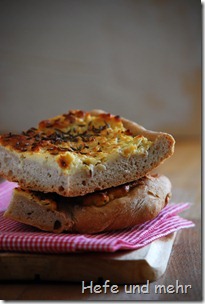
I like to watch the regional TV shows from other parts of germany because I always learn something new about this region. This time I learned about a pie called “Salzekuchen” in a TV show about the hessian kitchen. After a little search in the internet, I know now that Salzekuchen is also called Ploatz, Plootz or Bloads and is typical for Hesse, Parts of Franconia and the region of Rhön and Hohelohn. It is made of a Bread dough which is topped with a potato or onion mixture. A typical dish in former days, when the village meets for baking bread. For lunch a part of the dough was set aside and used for Salzekuchen.
I decided to make the potato salzekuchen, but I change the recipe a little bit. The original recipe called for about 200ml canola oil. I think this amount is a little bit to much for nowadays where people normally spend most of their days in offices instead working heavily on a farm.
This lighter variant of Salzekuchen is very delicious and we will eat this again, for sure!
Salzekuchen
Dough
- 250g flour Type 550
- 100g whole rye wheat
- 150g spelt flour Type 630
- 320g water
- 30g (canola-)oil
- 10g fresh yeast
- 10g Salt
- 30g Sourdough starter (optional)
Filling
- 350g potatoes (cooked and mashed)
- 250g Curd (Quark )
- 30g (canola-) oil
- 300g onions(finely diced)
- 1 Egg
- Salz
- Macis
- allspice
- Pepper
- caraway seeds
Knead all ingredients for the dough 5 min at slow and 5 min at fast speed.
Let the dough rise for 1 hour.
Now roll the dough to an right-angle and place it on a paper lined baking tray.
For the filling mix potatoes, curd, oil, onions and egg, then season with salt, macis, allspice and pepper. Spread the filling on the dough and sprinkle with caraway seeds.
Bake at 220°C for about 45 min until golden.
I sent this entry to Yeastspotting, Susans weekly showcase of yeast baked good.
Deutsch



Hallo,
kann man den Teig und die Füllung auch einen Tag voher vorbereiten (Übernachtgare) und dann am nächsten Tag fertigmachen und backen?
@Sabine: Ja, das klappt 🙂